- Home
- M G Vassanji
The Gunny Sack Page 15
The Gunny Sack Read online
Page 15
Kulsum would have something for our edification, a story from the mythology … How the five Pandava brothers, once having given their word to their mother to share everything, went on to share their wife. How Tara Rani would steal into the night to pray to her Lord against her husband’s wishes, until one day he found her out and with sword in hand waited for her, only to see the evidence in her hand, the meat, turn into grapes and ladoos into oranges. “Rani, show me this path,” he pleaded …
And sometimes, after much cajoling … loading her with a plate of pawpaw and a glass of hot milk … promises of pressing her aching feet and aching head … she would relent and part with a bit of her own past.
Shamim still plied me with fairytales, with Ali Baba and Aladdin … and when she played the Sphinx in a school production, on whom could she practise her lines but me …
And, at the bottom of the stairs, sat one Edward bin Hadith, fundi, tailor. An improbable name, a mixture of English and Arabic, “Edward, son of Story,” but he insisted on its correctness, and at the end of the month he would make an Arabic-looking scrawl in the long black ledger book and take whatever remained of his earnings. He came from a village near Mombasa and occasionally went home and sent letters there. He had been banished under the stairs by Kulsum because out in front he never ceased chatting (kuru-kuru-kuru-kuru, as she put it) and would not let the customers be heard; or, worse, he would involve them in long convoluted conversations, until, inevitably, they beat a retreat, seeking refuge in the street. In the alcove, the only catch in his wicked snare was I, whom she could spare.
Sometimes, even there, he would call out to a passing woman, “Shoga, do you know the time?”
“As if I carry a watch. Are you a fool or what?”
And he would break into a joyful cackle, thumping on the wooden stand of the sewing machine, at having drawn notice.
“Salum, come here. Come here, come here,” he would wave me over as I came down the stairs.
“What? I want to go.”
“Come here, I tell you. What’s your hurry?”
“So?”
“Listen carefully now at how Abunawas conned his neighbour into exchanging a small saucepan for a huge cauldron.”
“But you’ve told me that already!”
“Okay, then. Do you know why dogs sniff at people’s arses?”
He would relate with gusto, waving his arms, thumping the machine, taking time to vent his cackle, and I stood spellbound, or simply detained forcefully by his hand on my arm. By the time he had finished and wiped tears from his eyes, a pack of African boys and girls would be gathered behind me outside the doorway.
Of the three tailors, Edward took away the least money at the end of the month. Beside him in the alcove sat the master fundi, Omari, who would laugh at Edward’s jokes and chat with him, but never set aside his work. Kulsum gave him the hardest but the most lucrative assignments: men’s shorts, school uniforms on contract, clothes for Sona and me.
Efficient Omari, dreaming Edward. Sometimes in the afternoon Idi, Mzee Pipa’s chauffeur, would drop in for a chat, sitting at the bottom of the stairs, having brought boys from school—Pipa’s own Amin, and others whose fathers could afford to pay. Idi and Omari went home together, smartly groomed, newspapers under their arms: two men of the world who knew what they wanted, leaving Edward to finish his work.
But every Friday Idi had an errand to run before he left. He drove to mosque with two plates of food; one, rich and fresh, for God, and the other, stale and hard, for Mzee Pipa’s sister, a pauper who sat outside the mosque with a white enamel plate and a begging bowl. One Friday Idi had a joke at the expense of God and switched the two plates, as Mzee Pipa found out when he got the chit that Idi brought with him from the mosque while announcing that he had found a new job. It was with the new Labour Union on Viongozi Street a few blocks away.
If you wanted to point out the meanness of the Pipas, you would point a finger to the old man’s sister, a pauper to whom her brother sent charity in the form of stale chappatis and a fifty-cent coin every Friday, the day when all the twisted-mouthed, the lame, the elephant-headed and -footed, the pock-faced, the noseless, the sightless and others paraded the streets with begging bowls and got theirs too. Yet Idi’s act was considered generally not as charity towards the sister but as a crime against God. The only person who lauded his act was the Pipas’ old enemy Roshan Mattress. But this woman was carrying on an affair in broad daylight with a Punjabi policeman, what could she have to say about good and evil?
What then, did Idi and Omari want? Idi and Omari belonged to the Party … whose office was on Viongozi next to the Labour Union’s and was mysteriously lifeless except in the evenings … the Party which the coalseller celebrated on his rickety Dodge that brought us from school, we who could not afford Pipa’s gleaming green Ford Taunus … the Party with which—as we later realized—Nuru Poni also sympathized. But then, under the two queens, it was only an irritation—it did not like you calling the servants “boy,” or “golo”—not to be heard, anyway.
The window. It looked down on Kichwele and Viongozi and up at the stars. It had iron bars painted silver that felt cold when I pressed my temples against them. Half-curtains hung from a slack spring.
From this window you could look straight down into the first-floor flat once occupied by the Mawanis and now by a Goan family. As soon as they moved in, Mrs. Daya announced there was something funny about them. They came with a secret to hide. There were five of them, the mother and father, and two girls and a boy. The eldest was Alzira, in her mid-twenties, and she soon won a place in our hearts and a reserved seat on the bench in our shop. Tall and gangly Alzira, with a large mouth and short, straight hair, her long, faded dress hanging loosely on her frame. She was a dressmaker. In the late afternoons she would walk in, with a piece of cloth and a threaded needle in her hands, a large grin on her face, and sit on the bench, chatting with Kulsum, exchanging banter and gossip with the girls when they were around.
But in her home it was all different. No laughter there. The father was a retired civil servant who emerged, it seemed, only to track down a newspaper or a bottle of beer. The mother appeared even less frequently. The brother and sister, Peter and Viviana, had a life outside Kichwele and Viongozi, in the world of the Goan Institute and parties and dances, and were rarely home. But Alzira … Alzira was ours. From my window I could see into all their three rooms, all facing Kichwele, all with large uncurtained windows, all enclosing an unbearable gloom. It was like watching a silent film, an adult film society movie without dialogue where the pain and hurt are screaming through the silence, scene after scene of meaningless, forced activity that I saw from my second-storey perch, temples pressed against the cool metal bars.
To this window I would be drawn at four in the morning, when the air felt cool and unspent and the street below was deadly still and the street lamps burned with a steady glow like breaths of life suspended in the darkness … the deadest time of night, when only the gods could be abroad, and those seeking the gods. A little before four, Jogo’s father approached, limping on the street, calling on people to wake up and remember the Eternal, except that his voice grated so much and what it spoke was so ridiculous, it reminded you of anything but the Eternal. A little after four-thirty came a shuffling sound from a long way off on the street, accompanied by murmurs. This was the gang of Kulsa Thauki, all women, except for the watchman in a blanket leading the troop, that left somewhere from Msimbazi and marched in the middle of the street all the way to the mosque, picking up more of the faithful on the way. There was a time when Kulsum was hit with the meditation bug, then the troop would shuffle to a stop right below the window and Kulsa Thauki would yell, not too loudly, “Kulsum Bai, are you coming?” If I was at the window, I would shout, “Wait!” and if not, Kulsum would get out of bed shouting, “Yes! Yes! Wait a little while!”
By the time the pack had left, something had been lost from the night’s mystery …
/> The scissors. I see Mehroon chasing her sister Yasmin with the scissors, through the bedroom, the sitting room, the dining room, round and round through the three doors. There were times when all order broke down: tears, screams, warnings and threats. And Kulsum tearful—
Go on, Shehru. There’s no holding back, now.
Kulsum would be in tears—
Shehru!
She too broke down … at the end of her tether, she would give a whimper … and then … one-two-three she would beat her white chest with her hands, she would beat it until it was a painful, smarting dull-red and say—“I give you my life, I give you my life, I give you my life”—and weep uncontrollably.
Then the imprecations would begin, “No, Mummy! Please, Auntie. We are sorry. Never again. No, Mummy!”
And peace would return.
Thank you, Shehru.
FORBIDDEN FRUIT.
Five years—half a lifetime—passed, gradually the memory of my father, Juma, was receding behind the overgrowth of fresh memories that were appearing with the density and vigour of a jungle. He became part of a glorious, idyllic past framed for us in his picture on the wall, stored for us in the locked glass cabinet that housed our former toys. Beside Kulsum’s bed was another glass case, long and rectangular on a round table, in which stood a rust-red and black, two-feet-long model steamer given him by a shipping agent for some service. It looked so real, this SS Nairobi as we called it for want of a better name, its four-blade propeller and its rudder heading it straight towards the heart of Kariakoo—we would look at it admiringly, every time discovering something new and delightful about it: three lifeboats suspended on either side, decks protected by railings, the exquisite little cabin doors and ladders and cargo hatches that opened. No guest left without being suitably impressed. But no-one knew what ship it was, its real name. At the seashore our eyes became used to fruitless searches among the numerous cargo liners that hooted their way in and out of the harbour, jostled by one of the two tugboats. Only once, on my own, I thought I saw the real thing—rust and black, long with white cabins, three lifeboats on each side … it was so much like the model in our sitting room. I ran home in great excitement to report the discovery. There were many believers. I was chided for not having thought to look for its name, and the next afternoon after school Mehroon and Yasmin and I were sent off to the seashore on a mission to confirm my find. It was as though we were in some sense going back to the past … or if not actually going back then touching it in some way. All the way to the shore Mehroon and Yasmin would talk of nothing but the old days in Desai Road, of which they of course remembered much.
But there was no ship of that description in the harbour … nothing rust and black … in fact nothing but a white passenger liner, like a plastic toy ship with holes punched at the windows. My ship had sailed away …
We should have known—we knew it—but what’s wrong with hoping … in case Time makes a false move … it doesn’t, of course. The past is just this much beyond reach, you can reconstruct it only through the paraphernalia it leaves behind in your gunny sack … and then who would deny that what you manufacture is only a model …
At first the SS Nairobi was kept locked in its case and treated with extreme care. It was the star show in our sitting room. Kulsum sometimes hid banknotes behind the ship. But then one day the key got lost, the hundred-shilling note behind the ship was urgently needed, and the lock had to be forced. After that, important pieces of paper like electric and water bills found shelter behind the ship, and then in front, and sometimes on the funnel. Some time later the glue inevitably came off a cowl and it toppled; then the cable supporting a lifeboat broke; a ladder slipped; the main antenna broke, a cargo boom became detached and hung from a mere pulley thread … until finally we had a capsized ship, a memory burdened by day-to-day worries like unpaid bills and unanswered letters …
Among the toys in the toy cabinet was a chubby, red plastic doll in a round frame on which it rolled with a tinkle. It was my baby-show prize. One December Begum brought it out, gave it a cotton-wool beard, put a red cap on it and put the finished Father Christmas in our shop window. It drew crowds of kids for two Decembers, before it too bit the dust, dented, punctured, fly-specked.
… The clutter of memory that eventually finds its way into a … gunny sack. She smiles, Shehrbanoo. And throws out three knives.
Oh yes, there were the three Kashmiri daggers, of course, whose blades were now rusted. No-one knew what to do with them, where to put them. And there was a sword with a red scabbard. My father Juma a closet pirate? And what about the six rugby balls? Juma, a fence? But, six rugby balls, for God’s sake!
One day Kulsum had a dream. She saw Juma in his grey cashmere suit returning home from a night out. “He walked in and then seemed to recede, approaching and receding, and I said, ‘Aré, listen, where have you been? The children have been crying for you, they want to go out for ice-cream at night and here in Kichwele there’s no-one to take them, there’s no-one to relieve me in the shop and sometimes when I want to go for pee or water I ask Parmar to wait there and I go up …’ and he said, ‘Don’t complain, Kulsum. I would so much like to eat an apple,’ and he sat down on the chair and I went to bring him an apple, but the next instant, when I had returned, there was no-one on the chair, it was empty. I woke up with my heart beating thur thur like a fan.” The solution was clear. Begum and Mehroon concurred: apples had to be sought.
You found apples mostly in story books, where they hung from trees in leafy orchards and sandy-haired boys in shorts and stockings and pretty girls in blue frocks climbed to retrieve them. The apple was the prince of fruits, second only perhaps to that fruit which Roman princesses with soft undulating bodies like Elizabeth Taylor’s in soft silky gowns indulged in while lying lazily at a pool or on a raft: a bunch of grapes. It was difficult to find these fruits in Nairobi, how much more so in hot, humid, Dar! In Dar you could buy apples and grapes and chocolates at the Lushoto Garden Store downtown, frequented by the pretty and smart mothers of those sandy-haired children whom we saw on our way to Government House to celebrate the Queen’s birthday.
Idd was approaching, it was Ramadhan. The best part of Ramadhan was that shops stayed open late and we could play on the sidewalks way after dusk. The best time to play hide-and-seek is after dark on the street when there are spots of light and many shadows to hide in. The nice thing about hide-and-seek is that boys and girls, old and young, can play. Inside the shops about this time stocks were running low and cashboxes feeling solid. My father up there had perhaps realized that it was the time of year when he could expect a treat from his loved ones on the ground and had put in a request.
On the supposed last day of the fast, Begum and Mehroon went to Lushoto Garden Store to buy some apples. It was not as easy as they had thought. You have to order apples, they were scornfully told. How many do you want? Four, they said, not a little intimidated. Hunh. Not only did the Europeans have their orders; it turned out that my father was not the only one in the spiritual domain who loved apples. After much pleading and repetition of Kulsum’s dream, it was decided to deprive some European children of their share. Begum and Mehroon returned with four large apples.
These four large apples, not quite as red as in story books, but with shades of green and orange and yellow and purple that gave them more character, more mystery, were placed on a plate on the dresser in our bedroom, beside the customary plate of sweet, fried vermicelli to be taken to mosque the following morning: only if the moon was sighted before then. But the moon was not sighted that night, Idd was delayed another day, the vermicelli was taken away and distributed for breakfast, and the four apples stood enigmatically on their plate, high up on the dresser, sending out a glorious aroma.
What must Eve have suffered as she watched the forbidden apples hanging temptingly in front of her … It is not simply the taste … it is also the mystery … the knowledge!
At ten that morning the coast was clear,
Begum was in the kitchen, Mehroon in the store. Without a conscious thought in my head, like a hawk, I picked up an apple and raced out of the bedroom, through the dining room and up to Sharrif’s roof where I ate it in breathless large bites, core and all. And when I’d eaten it I sat there, still breathing loud gulps of air, watching the charcoaled stumps on one of the walls. Tears of guilt fell down my cheeks.
Between four apples and three apples, there is a quantum of difference—that of a crime committed. Between three apples and two apples, the difference is not as great. Slowly I got up, dusted myself, and walked down to the flat. The coast was still clear, the crime undetected. I took the three remaining apples and this time walked to the roof and ate them all.
Inevitably, it was Begum who detected the crime, saw the empty plate, and gave a scream of rage. Immediately Ali was fetched, but the servant indignantly denied the crime and was believed. He did not even know what this new-fangled fruit was. That left four juniors, Shamim being presumed innocent, and Begum Sherlock got to work. It was right up her line.
The four of us were lined up in the bedroom, in front of the empty plate. All acknowledged the gravity of the crime, against God and the Dead, all denied having committed it. But she was nobody’s fool. “Confess now,” she said, “and you’ll be forgiven. At least you were honest.” Silence. “This is your last chance, I am warning you. Then I’ll show no mercy. Mummy will write a letter to your teacher. You’ll be put to shame before the whole school!” Still, silence. “All right, I’ll show you who’s clever!” She had already told us the story of the short straw, how the thief broke his in half for fear that it would grow. So what could she do now? Plenty. She illustrated with another story.

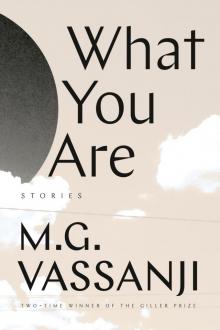 What You Are
What You Are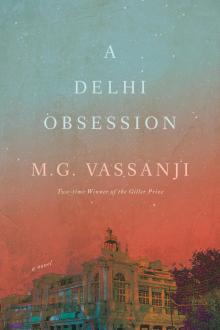 A Delhi Obsession
A Delhi Obsession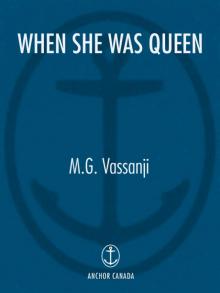 When She Was Queen
When She Was Queen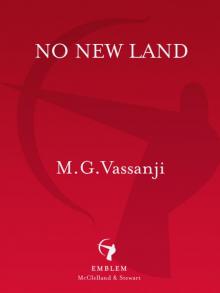 No New Land
No New Land Nostalgia
Nostalgia Mordecai Richler
Mordecai Richler The Book of Secrets
The Book of Secrets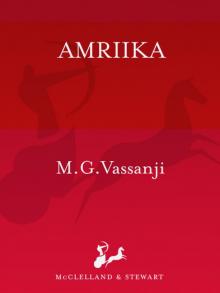 Amriika
Amriika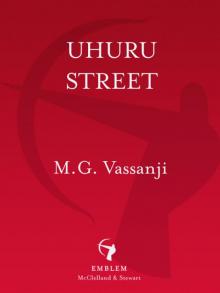 Uhuru Street
Uhuru Street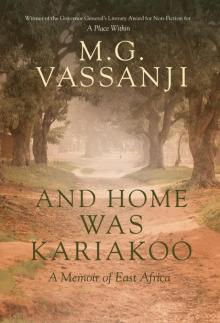 And Home Was Kariakoo
And Home Was Kariakoo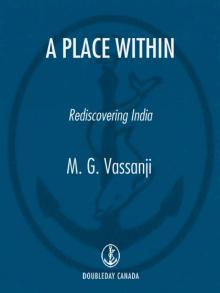 A Place Within
A Place Within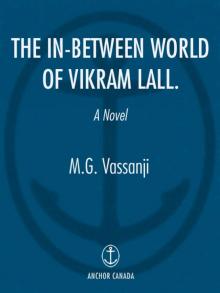 The In-Between World of Vikram Lall
The In-Between World of Vikram Lall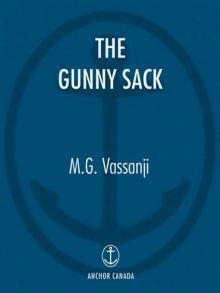 The Gunny Sack
The Gunny Sack